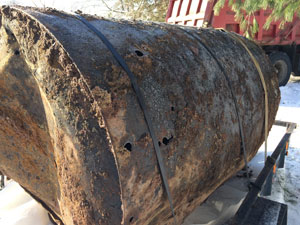Residential Underground Oil Tank Removal
For nearly twenty years, the NORCON team has been specializing in underground oil tank removal for New Jersey homeowners. Our trained, experience staff works with clients to ensure that the process goes quickly and smoothly—and without damaging your property. NORCON oil tank services are ideal for NJ home owners who are:
- Purchasing or selling a property
- Converting to a new above ground oil tank or gas system
- Concerned about oil contaminated soil and water
- Seeking information about undocumented tanks
The Oil Tank Removal Process
 Before work is done, NORCON visits your property to perform a no-cost site inspection of your oil tank. This allows our team to observe the oil tank location and provide a competitive price for removal. Within three business days, we will provide a proposal for tank removal. After you have accepted the proposal, we will contact your township to obtain permits and schedule an inspection. Then, we will:
Before work is done, NORCON visits your property to perform a no-cost site inspection of your oil tank. This allows our team to observe the oil tank location and provide a competitive price for removal. Within three business days, we will provide a proposal for tank removal. After you have accepted the proposal, we will contact your township to obtain permits and schedule an inspection. Then, we will:
- Excavate, evaluate, and segregate the soil above the tank.
- Cut open and thoroughly clean the tank in accordance with American Petroleum Institute guidelines.
- Remove the underground oil tank from the ground and inspect it for holes. This occurs in the presence of our staff and a township official from the construction or health department.
- The ground and soil surrounding the tank are inspected for discharge and contaminants.
- Inspect and clear the tank for recycling, and backfill the area with clean fill material.
- Submit proper documentation (receipts and disposal tickets) to the township in order to close out the permit file.
- Provide the property owner with a closure report and certification, including photographs, copies of permits, and receipts for tank disposal.
Frequently Asked Questions for Oil Tank Removal
Call NORCON Environmental for Residential UST Services
NORCON Environmental has been serving NJ residents for over 30 years. We’re a trusted name in environmental consulting, and our team has extensive experience in the location, removal, and closure of underground storage tanks. If you require tank assessment or remediation, call 201.230.8800 or submit a secure, online information form. We look forward to partnering with you.


